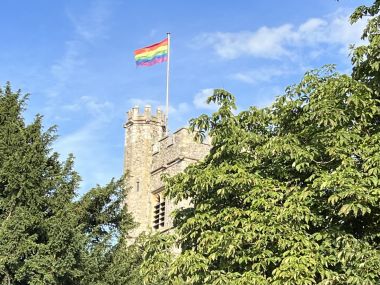Same-sex blessings and safeguarding dominate CofE General Synod

The Church of England's General Synod meets again this weekend. A few weeks ago it looked as if it would be a relatively quiet event, but that is no longer the case. Instead safeguarding and same-sex blessings will once again keep people talking - over half of the 237 questions sent in advance by Synod members reference one or the other.
Most of the concerns about safeguarding are focused on the Archbishops' Council's decision to sack two of the three members of the Independent Safeguarding Board. Critics of the Council claim that the board members were sacked because they were too independent and too focused on the needs of survivors and the Archbishops' Council were concerned with what they might have said in their report to General Synod.
In contrast, William Nye, the Secretary General of the Church of England wrote to Synod with the vague explanation that "working relationships between two members of the Independent Safeguarding Board (ISB) and the Council have broken down."
Gavin Drake, a lay member of General Synod, wants to get to the bottom of what happened. He has tabled a motion, lamenting "that any working relationship between many survivors and victims with the Archbishops' Council has been broken" and calling for an independent inquiry into the "safeguarding bodies, functions, policies and practice in and of the Church of England." The motion will be debated on Monday.
Despite the vote in favour of introducing prayers for couples in same-sex relationships in February, it appears that the deal may not quite be done.
A group of 27 church leaders has written to the bishops of the Church of England saying that "If the Church of England continues with the current direction of travel and a process which is unlawful and unclear, there are going to be two main significant consequences: disunity and disrepute."
On the face of it, the sticking point appears to be how the 'Prayers of Love and Faith', as they are known, will be authorised. Originally the bishops were going to commend them in the same way they would commend prayers for the coronation or other uncontroversial matters.
In the papers issued to General Synod members last week, the bishops have suggested that commendation is now likely to be in the hands of the Archbishops.
The 27 church leaders writing this letter to the bishops are convinced that the Prayers of Love and Faith need to be treated as new liturgy and therefore undergo full synodical scrutiny. This would require there to be a two-thirds majority in favour of the proposal in each of the three 'Houses' of Synod – something the letter makes clear was not achieved in February.
The final paragraph may shed light on the underlying reason for this letter: "Finally, we want to assure you that by writing this letter we want to be part of the solution rather than part of the problem. For that reason, we would want to recommend that some of our number are part of an initial discussion about how there might be a settlement that charted a way forwards using Canon B2 which would enable us to walk together in a manner that would be far more unifying and sustainable than the current way. In our belief, that is worth aiming for."
In February, one of the signatories of this letter asked Synod, "Can we not seek to move towards a mediated settlement which takes seriously the very deep irreconcilable differences that are between us and which seeks to find the maximum unity without theology compromise?"
These 27 church leaders, come from a broad coalition of organisations representing both a variety of worship styles - HTB (Holy Trinity Brompton) to the Prayer Book Society - and approaches to secondary issues such as women's orders - from New Wine to Forward in Faith.
But they are united in the view that those who believe the Prayers of Love and Faith are contrary to the teaching of Scripture need a structural settlement to be able to continue ministering in the Church of England in good conscience. In February, they believed that talk of "pastoral reassurance" would offer them the opportunity to put forward their case. This letter suggests that they have not been heard.
Which leaves the bishops with a conundrum. Do they risk dividing the Church by authorising the Prayers themselves (possibly overriding synodical processes as they do so)? Or do they press pause, risking the opprobrium of those who have been campaigning for same-sex blessings for decades, in the hope of finding the elusive solution that would be acceptable to two-thirds of each House of General Synod?
Just a few weeks ago, Bishop Sarah Mullally said that the bishops were "on track for November". Discussions this weekend will reveal whether that was just wishful thinking.
The General Synod livestream can be found here
Susie Leafe is director of Anglican Futures, which supports orthodox Anglicans in the UK.











